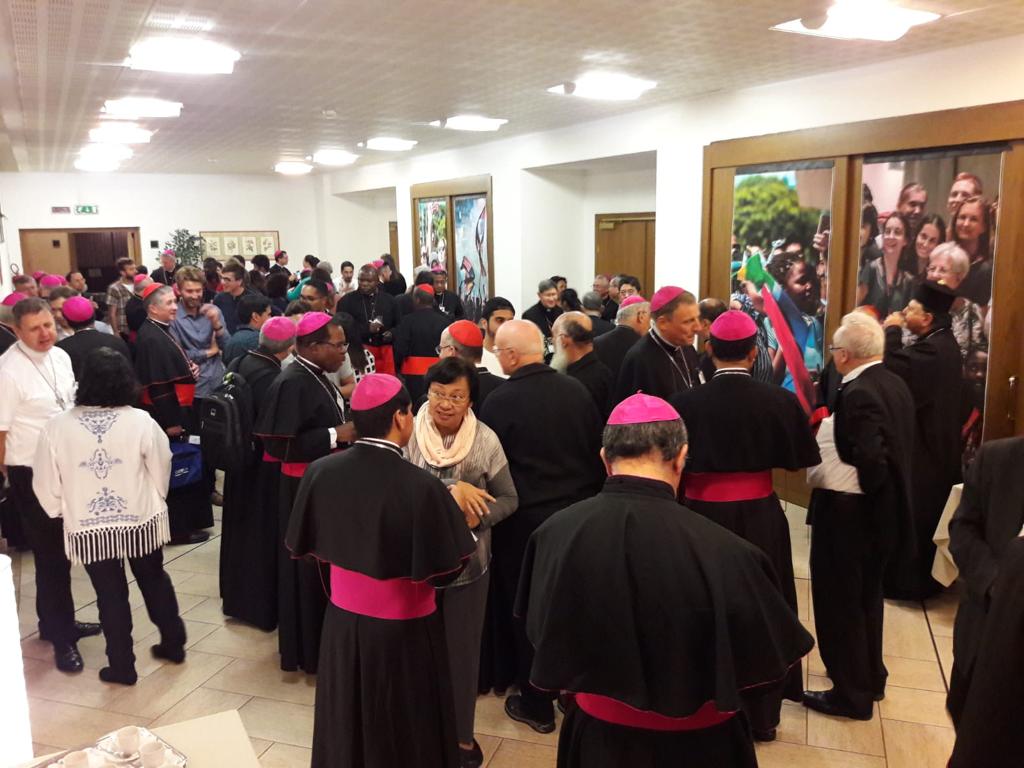Conversations in different languages could be heard amid the tastefully and simply set tables. For three evenings, the young people of the Focolare acted as hosts in a hall, close to where the works of the Synod will carry on up to 28 October. After a warm welcome, the three dinners revealed to be the right occasions for the exchange of ideas, informal sharing and mutual interaction. During dessert, there was a presentation of the recent international Genfest held in Manila and some experiences, and stories of commitment and coherence to boost closer contact with the synodal Fathers, in line with a meeting held a day earlier, where they express queries, uncertainties, choices, in the hope that the Synod would propose some answers. In the second soiree, František from Czechia took the floor. His words highlighted a genuine passion for politics and concrete commitment in view of the next European Parliament elections emerged with the request, “Please support me with your prayers, so that I may always be faithful to the choice of serving my people, without any personal interest.” A similar story came from Nicola. She is 33 and a pediatric therapist in a university hospital. “I engage in rare pathologies and pediatric insurgence, and therefore I am always in contact with situations often at the brink of death. The difficulty at times lies in communicating to the relatives, the prognosis and life expectancies of the child. In these moments, I entrust myself to God, so that he may help me find the right words and attitude. Cynical detachment is a due form of survival, but we mustn’t lose the human dimension. Every day for me is like a gym in which to love and serve God.” Then it was Nicola’s turn. “Practicing this profession – he explained – means living at the limit between faith and reason; in these years I have learned what suffering is, and what it means to live immobile on a bed, attached to the mechanical lung for breathing. At times my faith is harshly put to the test, but then I have no time to reflect, being ’forced’ to see to the people I have before me, and loving them. This is really a countenance of Jesus Forsaken. If I manage to welcome him poor and miserable as he is, this fills up the void. I have to face many situations.  The families of the eastern countries are at times the most desperate since they do not have adequate healthcare systems, both from the economic and clinical standpoints that can help them. This is why they undertake hope journeys to our hospitals in search of treatments, which in some cases imply great expenses, given that these are issued only to Italian citizens. These situations lead us to reflect that at times, being born in one part of the world is just a matter of luck. It is in these cases that God reveals his grandeur and asks you to do the impossible. We certainly must not break the laws but we can try to help in other ways, for example, proposing strategies to limit at best the deformity of the joints, or trying to stand by and be of help.” Time had flown. It seemed like the guests did not wish to leave. The challenge of a deep and reciprocal listening between generations, the reason for the Synod itself, had also taken the form and consistency even in a dinner. And the dinner ended with the words of the song dedicated to Mary, the silent response of utmost love. By Chiara Favotti and Gustavo Clariá
The families of the eastern countries are at times the most desperate since they do not have adequate healthcare systems, both from the economic and clinical standpoints that can help them. This is why they undertake hope journeys to our hospitals in search of treatments, which in some cases imply great expenses, given that these are issued only to Italian citizens. These situations lead us to reflect that at times, being born in one part of the world is just a matter of luck. It is in these cases that God reveals his grandeur and asks you to do the impossible. We certainly must not break the laws but we can try to help in other ways, for example, proposing strategies to limit at best the deformity of the joints, or trying to stand by and be of help.” Time had flown. It seemed like the guests did not wish to leave. The challenge of a deep and reciprocal listening between generations, the reason for the Synod itself, had also taken the form and consistency even in a dinner. And the dinner ended with the words of the song dedicated to Mary, the silent response of utmost love. By Chiara Favotti and Gustavo Clariá
Pray for peace
Pray for peace




0 Comments